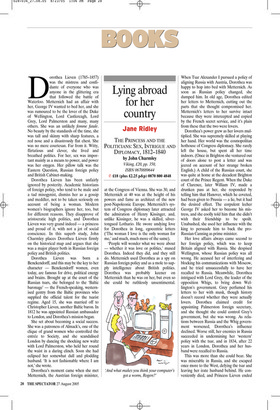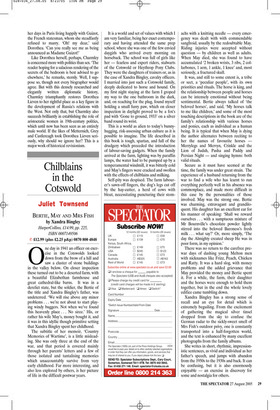Lying abroad for her country
Jane Ridley
THE PRINCESS AND THE POLITICIANS: SEX, INTRIGUE AND DIPLOMACY, 1812–1840 by John Charmley Viking, £20, pp. 350, ISBN 0670889644 ✆ £18 (plus £2.25 p&p) 0870 800 4848 Dorothea Lieven (1785–1857) was the mistress and confidante of everyone who was anyone in the glittering era that followed the battle of Waterloo. Metternich had an affair with her, George IV wanted to bed her, and she was rumoured to be the lover of the Duke of Wellington, Lord Castlereagh, Lord Grey, Lord Palmerston and many, many others. She was an unlikely femme fatale. No beauty by the standards of the time, she was tall and skinny with sharp features, a red nose and a disastrously flat chest. She was no mere courtesan. Far from it. Witty, flirtatious and clever, she lived and breathed politics. For her, sex was important mainly as a means to power, and power was her oxygen. Her pillow talk was the Eastern Question, Russian foreign policy and British Cabinet-making.
Dorothea Lieven has been unfairly ignored by posterity. Academic historians of foreign policy, who tend to be male and a tad misogynist, dismiss her as a gossip and meddler, not to be taken seriously on account of being a woman. Modern women’s biographers ignore her, too, but for different reasons. They disapprove of aristocratic high politics, and Dorothea Lieven was very grand indeed — a princess and proud of it, with not a jot of social conscience. In this superb study, John Charmley places Dorothea Lieven firmly on the historical map and argues that she was a major player both in Russian foreign policy and British politics.
Dorothea Lieven was born a Benckendorff, and this may be the key to her character — Benckendorff women, even today, are famous for drive, political energy and brains. Brought up at the court of the Russian tsars, she belonged to the ‘Baltic baronage’ — the French-speaking, westernised gentry from the Baltic provinces who supplied the official talent for the tsarist regime. Aged 15, she was married off to Christopher Lieven, another Baltic baron. In 1812 he was appointed Russian ambassador to London, and Dorothea’s mission began.
She set about becoming a social success. She was a patroness of Almack’s, one of the clique of grand women who controlled the entrée to Society, and she scandalised London by dancing the shocking new waltz with Lord Palmerston, who held her round the waist in a daring clinch. Soon she had eclipsed her somewhat dull and plodding husband. ‘It is not fashionable where I am not,’ she wrote.
Dorothea’s moment came when she met Metternich, the Austrian foreign minister, at the Congress of Vienna. She was 30, and Metternich at 40 was at the height of his powers and fame as architect of the new post-Napoleonic Europe. Metternich’s system of Congress diplomacy later attracted the admiration of Henry Kissinger, and, unlike Kissinger, he was a skilled, silvertongued Lothario. He swore undying love for Dorothea in long, egocentric letters (‘The woman I love is the only woman for me,’ and much, much more of the same).
‘People will wonder what we were about — whether it was love or politics,’ mused Dorothea. Indeed they did, and they still do. Metternich used Dorothea as a spy on Russian foreign policy and as a mole to supply intelligence about British politics. Dorothea was probably keener on Metternich than he was on her, but even so she could be ruthlessly unsentimental. When Tsar Alexander I pursued a policy of aligning Russia with Austria, Dorothea was happy to hop into bed with Metternich. As soon as Russian policy changed, she dumped him. In old age, Dorothea edited her letters to Metternich, cutting out the parts that she thought compromised her. Metternich’s letters to her survive intact because they were intercepted and copied by the French secret service, and it’s plain from these that the two were lovers.
Dorothea’s power grew as her lovers multiplied. She was supremely skilled at playing her hand. Her world was the cosmopolitan hothouse of Congress diplomacy. She rarely left the house, but spent all her time indoors. (Once in Brighton she ventured out of doors alone to post a letter and was jeered on account of her strange broken English.) A child of the Russian court, she was quite at home at the decadent Brighton court of the Prince Regent. When the Duke of Clarence, later William IV, made a drunken pass at her, she responded by telling him that Hanover, which he coveted, had been given to Prussia — a lie, but it had the desired effect. The corpulent lecher George IV asked her to become his mistress, and she coolly told him that she didn’t wish their friendship to be spoilt. Unabashed, she used her influence with the king to persuade him to back the proRussian Canning as prime minister.
Her love affairs always came second to her foreign policy, which was to keep Britain aligned with Russia. She despised Wellington, whose Russian policy was all wrong. He accused her of interfering and blocking his communications with Moscow, and he tried unsuccessfully to have her recalled to Russia. Meanwhile, Dorothea intrigued with Lord Grey, the leader of the opposition Whigs, to bring down Wellington’s government. Grey perfumed his letters to her with musk, though history doesn’t record whether they were actually lovers. Dorothea claimed credit for appointing Palmerston foreign secretary, and she thought she could control Grey’s government, but she was wrong. As relations between Russia and the Whig government worsened, Dorothea’s influence declined. Worse still, her enemies in Russia succeeded in undermining her ‘western’ policy with the tsar, and in 1834, after 22 years in London, Dorothea and her husband were recalled to Russia.
This was more than she could bear. She was miserable in Russia, and she escaped once more to the West, defying the tsar and leaving her irate husband behind. He conveniently died, and Princess Lieven ended her days in Paris living happily with Guizot, the French statesman, whom she steadfastly refused to marry. ‘Oh! my dear,’ said Dorothea. ‘Can you really see me as being announced as Madame Guizot!’ Like Dorothea herself, perhaps, Charmley is concerned more with politics than sex. ‘The reader hoping for a salacious rendering of the secrets of the bedroom is best advised to go elsewhere,’ he remarks, sternly. Well, I suppose so, though not every biographer would agree. But with this densely researched and elegantly written diplomatic history, Charmley triumphantly restores Dorothea Lieven to her rightful place as a key figure in the development of Russia’s relations with the West. Not only that, but Charmley also succeeds brilliantly in establishing the role of aristocratic women in 19th-century politics, which until now has been seen as an entirely male world. If the likes of Metternich, Grey and Castlereagh took Dorothea Lieven seriously, why should we ignore her? This is a major work of historical revisionism.












































 Previous page
Previous page